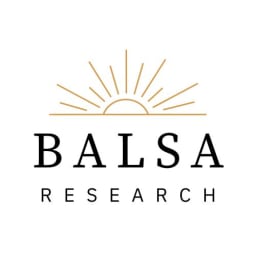
Balsa Research is a nonpartisan 501(c)(3) non-profit focused on crafting shovel-ready policies that actually address core underlying human needs. We model issues, draft viable legislation, commission academic studies, spread ideas, and work to enact change.
Balsa will focus initially on some combination of four fronts: Repealing the Jones Act, Reimagining NEPA, ensuring housing gets built where people want to live, and protecting against the risk that AI will cause human extinction.
We take a full stack approach to policy:
- Model the world. Find improvements that balance viability with physical impact.
- Compile options into Official Policy Binder and Official Solutions Website.
- Commission proper academic work to credibly quantify impacts on all fronts.
- Use this as an opportunity to run experiments and learn more.
- Draft model legislation using learnings.
- Spread the world via media and writing.
- Lobby. Pitch members of Congress and their staff. Do the work. Find champions.
- Start small if necessary. Wins beget wins.
Fundraisers

Flexible Funding for Balsa
This fund gives Balsa flexibility to pursue high-impact opportunities beyond our core policy work—including building capacity to help guide philanthropic capital effectively. Your donation here signals trust in our judgment about where our efforts can do the most good. If you're interested in donating more than $10,000 exclusively toward philanthropic infrastructure work, please get in touch at donations@balsaresearch.com .
6 supporters
DonateDonors
Richard Möhn I like ships. Let's have more of them!
Charles Beller To the fundraiser: Flexible Funding for BalsaWill Morgan Steve Newman To the fundraiser: Flexible Funding for BalsaCody Yakimoff To the fundraiser: Flexible Funding for Balsa
